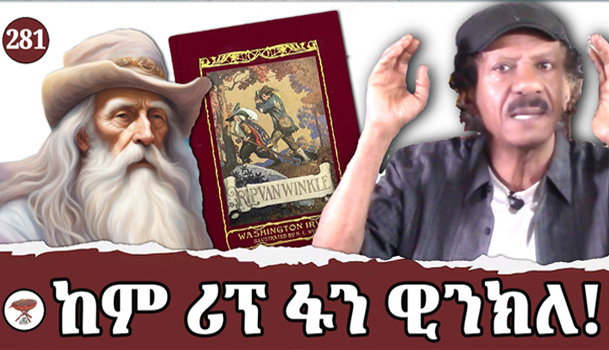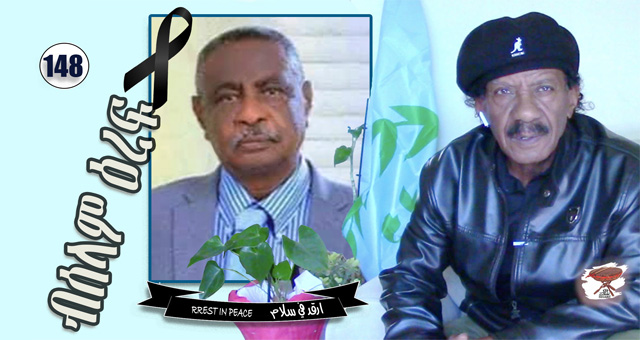Like Rip Van Winkle!
How long has it been since you left your home country? Are your memories intact? Do you have friends and family you keep in touch with? Maybe your childhood friends or your relatives?
Do you tear up or burst into tears with nostalgia, especially when you hear songs, or mundane events that remind you of the past? Or are you totally detached, free from the burden of memories and nostalgia? Maybe you do not show it, you pretend you are fine, though you are agonizing from inside.
I will tell you the story of Rip Van Winkle, hoping it will help you reflect and judge where you fit in the Eritrea that you left behind.
But first, let me thank my readers and viewers; Today we have reached Negarit 281, It’s been a long journey, and I am grateful you have come along with me this far.
The great Idris Mohammed Ali, whom the Eritrean ruling party jailed in 2005, without trial, is immortalized by many patriotic songs. One of them is the song I used in the intro to the video above. Last time, I was in the right melancholic mood when I came across the song. Believe me, I heard it for many times in tears—it moved me so much I was in tears as I sang along.
I was a little boy Am Amman returned to Keren after disappearing for 15 years in Sudan. He wore Arragi dress, white beards, a big turban, and cobra-skin shoes with a Sudanese cut. The people wondered how someone could be away from his hometown for that long!
Then there was a respected elder, Khelifa Adem Emnay, an ex-Italian soldier who served alongside the Italian occupational army in Libya. When Muammar Gaddafi came to power in 1969, he joked, “Maybe he is the offspring of an Eritrean soldier!” Time goes by and now we have so many Rip Van Winkles among us.
Rip Van Winkle——
In the quaint village nestled at the foot of New York’s Catskill Mountains, there lived a good-natured man named Rip Van Winkle. He known for his willingness to help neighbors with their chores and his fondness for telling. However, Rip’s greatest love was the freedom of the outdoors, particularly the solitary moments he spent wandering through the wilderness with his loyal dog, Wolf.
Rip’s wife, Dame Van Winkle, often scolded him for his laziness around the house and his propensity to shirk his responsibilities in favor of leisurely pursuits. Despite her frequent nagging, Rip was content with his routine. One fateful autumn day, feeling particularly burdened by his wife’s sharp tongue, Rip decided to escape her wrath and set off with Wolf into the mountains.
As he wandered deeper into the forest, he met a man carrying a keg and assisted him in carrying it to his destination deep in the forest. They came across a group of men in antiquated Dutch attire, playing bowling, the game of nine-pins. Rip, always friendly, soon found himself joining in their merriment.
The men offered Rip a drink from the liquor keg; he helped. Not accustomed to such strong liquor, Rip drank deeply and soon felt a drowsiness creep over him. Exhausted from his journey and intoxicated, Rip found a patch of grass under a large oak tree and laid down with Wolf by his side.
When Rip awoke, he was disoriented. Wolf was nowhere to be seen, and the men in Dutch clothing had vanished. Rubbing his eyes, Rip stumbled back toward the village, where he was met with an eerie silence. The familiar buildings looked weathered and strange, and the faces of the few villagers he encountered were unfamiliar and bore expressions of bewilderment.
Confused and anxious, Rip hurried to his cottage, only to find it in disrepair, and he didn’t meet anyone he knew.
Fearful and bewildered, Rip rushed through the village, searching for any sign of familiarity. Eventually, he stumbled upon a small inn where he was met with astonished gazes from the patrons. They asked who he was, and he said Rip Van Winkle. A man running for office asked him if he voted; Rip said he is a loyal subject of the King James. Rip had no clue the American Revolution war was fought against the British, and it was over; Americans had established a democracy.
A kindly old woman asked if he was indeed Rip Van Winkle, the man who had vanished into the mountains two decades earlier.
Two decades! The realization struck Rip like a thunderbolt. He had been asleep in the woods for twenty years. Incredulous, Rip learned from the villagers that much had changed during his absence. The colonies had won their independence from England, and his own wife had passed away, leaving their children grown and scattered.
Overwhelmed by the passage of time and the loss of his wife, Rip struggled to come to terms with his new reality. He moved in with his eldest daughter, who welcomed him with tears of joy and disbelief. Though his physical surroundings had changed, Rip found solace in the familiar faces of the village children, now adults, who remembered him fondly as the gentle storyteller of their youth.
As the years passed, Rip became a living legend in the village, his tale of inexplicable slumber spreading far and wide. He would often sit by the fire in the inn, recounting his adventures in the mountains and the strange encounter with the men playing nine-pins. The villagers would listen intently, hanging on to his every word, as if Rip’s story held within it a glimmer of the mystical and the unknown.
Through it all, Rip Van Winkle remained the same good-natured soul, though he had aged both in body and in spirit. He cherished the memories of his youthful adventures with Wolf and held onto the belief that life, with all its mysteries and changes, was a journey meant to be embraced with an open heart.
And so, Rip Van Winkle lived out his days in the village at the foot of the Catskill Mountains, a man out of time but forever connected to the land and its people. His story became a timeless tale of wanderlust, the passage of time, and the enduring power of human resilience in the face of extraordinary circumstances.
Such is the power of literature—stories are not made for specific people but for all. Anyone can see himself inside the story or outside it, depending on their experiences in life. Literature enriches our knowledge, it provides us with tools of thinking to improve ourselves, and, by extension, our culture. Importantly, it helps us grow as human beings.
A nation that fails to grow its intellectual capacity and create its own civilization, by extracting useful aspects of the world’s heritage, cannot survive with dignity. Worse, it may decay and die out.
Individual human lifespans may extend to forty-years at best, but the lifespan of nations is on a different scale. It takes a long time for nations to be created, though they may die abruptly, like many great civilizations that were suddenly lost. We need to be aware that countries need to be nurtured, like a human life, so that they can navigate swiftly towards a civilized, modernistic life, for the betterment of their people and humanity. I have no doubt that someday, Eritrea will accomplish that if we stay focused in a genuinely patriotic manner.





Awate Forum